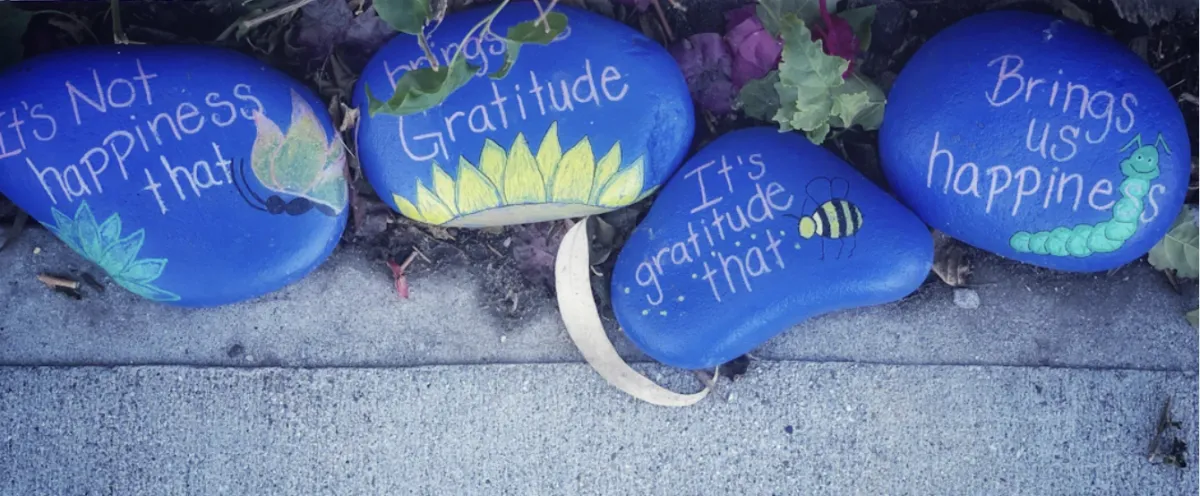
Spotlight on Gratitude
In this blog we take a closer look at Gratitude and discover (from recent research) 1) that it has an 'innate, genetic basis' among all humans, 2) that it can be promoted at any age using various Gratitude Interventions, and 3) that such strategies result in 'better mental health and wellbeing' for participants! So let's get busy promoting gratitude in our kids!
_______________________________________________________________________________________
Is everyone capable of experiencing gratitude? The short answer is... yes!
There's been a surge of interest in gratitude over recent years and a huge amount of research has revealed that gratitude is indeed something that's felt by people all over the world and across the entire lifespan. So yes, it has "an innate, genetic basis"* among all humans.
But what exactly is Gratitude?
Gratitude can be a temporary state OR an enduring trait, but it essentially stems from two things:
1) a recognition of the 'good things' in our life, and
2) a recognition that the source of this 'goodness' lies, at least partly, outside of ourselves.
These things are often followed by an impulse to express our gratitude in some way, through either words or deeds: to 'pay it forward' as they say.
But of course, the reason so many researchers have jumped on the gratitude bandwagon in recent years is because of the discovery (surprise, surprise!) that gratitude is foundational to wellbeing and mental health throughout the lifespan*.
A lot of the research has focused on the effectiveness of 'Gratitude Interventions', and the vast majority have shown that YES, you CAN introduce gratitude practices into your life and your home and YES they are very likely to:
• increase positive emotions
• reduce depression and anxiety
So.... the takeaway from all this is ... we should probably get busy helping our kids experience gratitude more often and also help them to develop the trait or mindset of gratitude!!!
And how do we do this?
There are a thousand ways to promote gratitude in kids!
If you don't believe me just Google it! 😉
But here are a few:
1. first let's get the obvious one out of the way: model gratitude yourself!
This requires a bit of honest self-reflection and perhaps even a shift in your own thinking and behaviour - but that's what parenting can do to us, isn't it!? For instance, how often does your child hear you expressing your gratitude for the good things in your life, versus how often do they hear you complaining and one thing or another? 🤔
2. draw your child's attention to the good things in their life.
Be careful not to do this in an annoying or relentless way. You have to pick your moments! But in general, if you can help your child notice how lucky they are (and almost all kids are lucky in at least a few ways) more often than you draw their attention (often unwittingly) to all the things that aren't quite right in their life, then you'll be getting them off to a great start towards a gratitude mindset.
3. implement a family gratitude practiceMake a family practice of sharing something at the dinner table that each family member is grateful for. We did this in our household, not every night of course but at least once a week. We started young though, before our kids could think it was uncool! Sometimes they weren't in the mood and said something like: "I'm grateful I didn't get hit by a bus today", but generally they enjoyed the practice and even started to initiate it themselves when they were older. 😄
4. start a gratitude jar
This is really popular in families as kids seem to love the visual aspect of this activity. Choose a glass jar so notes can be seen inside. Label it 'Gratitude Jar ❤️' and put a small, coloured notepad beside it, with pens or pencils and maybe even some things to decorate the notes with. Encourage your kids to write about a happy, grateful moment now and then and add it to the jar. If everyone in your family agrees, you could read all the notes aloud together once a month. Then start again!
5. help your child develop the habit of saying thank youIn our Foundations Program we teach parents and carers about the psychological benefits of developing the habit of saying please and thank you in early childhood. It's not about 'good manners' - it's about helping your child develop a gratitude mindset. If they are too shy to say thank you to, say, a shop assistant, you could encourage them to simply smile their thanks or give a thumbs up. Writing little thank you notes is also great for developing gratitude. And kids tend to enjoy decorating these too.
I hope we convinced you that.... feeling and being grateful is really important to wellbeing! So I hope you'll try some of these strategies at home, and the earlier the better!, so that your child can benefit from a gratitude mindset, not just while they're kids but for their whole lives.
And... finally, we agree with Cicero:
“Gratitude is not only the greatest of virtues, but the parent of all the others."
__________________________

